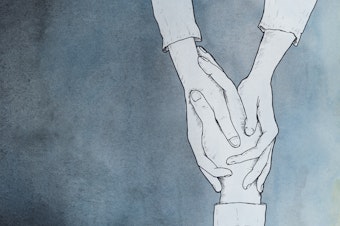Parth Shah
Stories
-

Feeding the Green-Eyed Monster: What Happens When Envy Turns Ugly
Envy is one of the most unpleasant of all human emotions. It also turns out to be one of the most difficult for researchers to study. And yet, there's mounting evidence that envy is a powerful motivator. This week, we explore an emotion that can inspire us to become better people — or to commit unspeakable acts.
-

The Ventilator: Life, Death And The Choices We Make At The End
Many of us believe we know how we'd choose to die. We have a sense of how we'd respond to a diagnosis of an incurable illness. This week, we have the story of one family's decades-long conversation about dying. What they found is that the people we are when death is far in the distance may not be the people we become when death is near.
-

BS Jobs: How Meaningless Work Wears Us Down
Have you ever had a job where you had to stop and ask yourself: what am I doing here? If I quit tomorrow, would anyone even notice? This week on Hidden Brain, we revisit our 2018 conversation with anthropologist David Graeber about the rise of what he calls "bullsh*t jobs," and how these positions affect the people who hold them.
-

Screaming Into The Void: How Outrage Is Hijacking Our Culture, And Our Minds
Turn on the news or look at Twitter, and it's likely you'll be bombarded by outrage. Many people have come to believe that the only way to spark change is to incite anger. This week on Hidden Brain, how outrage is hijacking our conversations, our communities, and our minds.
-

Baby Talk: Decoding The Secret Language Of Babies
Babies are speaking to us all the time, but most of us have no clue what they're saying. To researchers, though, the babbling of babies is knowable, predictable, and best of all, teachable to us non-experts. This week, we revisit our May 2018 primer on how to decipher the secret language of babies and young children.
-

You 2.0: The Empathy Gym
Some people are good at putting themselves in another person's shoes. Others may struggle to relate. But psychologist Jamil Zaki argues that empathy isn't a fixed trait. This week: how to exercise our empathetic muscles. It's the first episode in our You 2.0 summer series.
-

Decisions, Decisions: Some We Struggle To Make, Others We Can't Forget
This week on the Hidden Brain radio show, decision-making. We learn why we often stumble when trying to make ourselves happy, and why certain decisions leave us wondering "what if?"
-

Whose Utopia? How Science Used The Bodies Of People Deemed 'Less Than'
There is a long legacy of leaders exploiting the bodies of vulnerable people in the name of science. This week, the history of eugenics and medical experimentation on enslaved people in the U.S.
-

Life, Death And The Lazarus Drug: Confronting America's Opioid Crisis
More than 70,000 people died of drug overdoses in 2017 — many of them from heroin and other opioids. One of the most widely-used tools to confront this crisis is a drug called naloxone. It can reverse an opioid overdose within seconds, and has been hailed by first responders and public health researchers. But in 2018, two economists released a study that suggested naloxone might be leading some users to engage in riskier behavior — and causing more deaths than it saves. This week, we talk with researchers, drug users, and families about the mental calculus of opioid use, and why there's still so much we're struggling to understand about addiction. This episode originally aired in October 2018.
-

People Like Us: How Our Identities Shape Health And Educational Success
Generations of Americans have struggled against segregation. Most of us believe in the ideal of a colorblind society. But what happens when that ideal come up against research that finds colorblindness sometimes leads to worse outcomes?